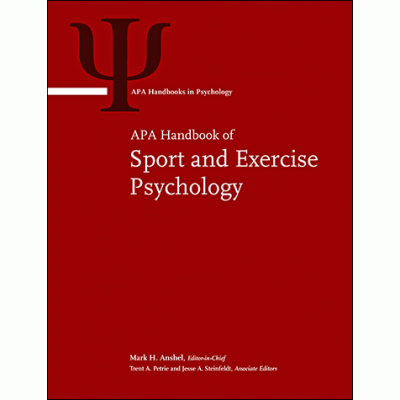APA Handbook of Sport and Exercise Psychology

DESCRIERE
2-Volume Set
- Volume 1: Sport Psychology
- Volume 2: Exercise Psychology
The 2-volume APA Handbook of Sport and Exercise Psychology presents new areas of research and links theory with emerging practice to reflect the latest developments in this constantly changing field.
The 77 chapters provide extensive coverage of conceptual frameworks and models, empirical findings, and practical interventions. Additionally, many chapters discuss topics not addressed in other publications, such as attention deficit/hyperactivity disorder, sleep disorders, life-span engagement in sport and physical activity, and professional ethics and governance.
Volume 1: Sport Psychology
Editorial Board
About the Editor-in-Chief
Contributor List
A Note From the Publisher
Introduction
I. Foundations and Contemporary Perspectives
- A Brief Global History of Sport Psychology
- Sport Psychology Research: Proper Standards and Limitations
- Conducting Experimental Research in Sport Psychology
- Psychological Assessment in Sport Psychology
II. Personality Sport Psychology
- Personality, Styles, and Orientations in Sport: Pros, Cons, and Guidelines for Predicting Sport Performance
- Cognitive and Personality Assessment in Applied Sport Psychology: Evidence-Based Test Selection
- From Talent Identification to Talent Development: An Overview and Critique
- Psychological Characteristics of Elite Athletes
III. Life-Span Developmental Sport Psychology
- Youth Sport: Meeting Unique Developmental Needs of Young Athletes for Preventing Dropout
- Sport Participation in Later Life
- A Developmental and Holistic Perspective on Transiting Out of Elite Sport
IV. Cognitive Sport Psychology
- Emotion and Sport Performance: Stress, Anxiety, Arousal, and Choking
- Emotion Regulation in Sport and Performance Contexts
- Attention in Sport
- Motivation in Sport: Theory and Application
- Cognitive Strategies in Promoting Physical Performance: Theory and Application
- Mindfulness in Sport: Neuroscience and Practical Applications
V. Social Psychology of Sport
- Girls and Women in Sport
- Understanding the Experiences of LGBT Athletes in Sport: A Multilevel Model
- Psychology of Disability Sport: Participation and Performance
- Group Dynamics in Sport and Exercise
- Effective Coaching: The Links Between Coach Leadership and Coach–Athlete Relationship — From Theory to Research to Practice
- Strategies and Communication Skills in Sports Coaching
- Audience Effects in Sport: The Reciprocal Flow of Influence Between Athletes and Spectators
- Hiding in Plain Sight: Discovering the Promises of Multicultural Sport Psychology
- Anger and Aggression in Sport
VI. Educational Sport Psychology
- Skill Acquisition: The Science and Practice of Teaching Sport Skills
- Information Processing Approach to Understanding and Improving Physical Performance
VII. Clinical and Counseling Issues in Sport Psychology
- Eating Disorders in Competitive Sport and Dance
- Attention Deficit Hyperactivity Disorder and Athletes
- Sleep Disorders and Remedies in Competitive Sport
- Current Approaches to Sport Psychology Consulting in Collegiate and Olympic Settings
- Athlete Mental Health
- Evidence-Based Sport Psychology Counseling
VIII. Psychological Issues in Sport Injuries and Rehabilitation
- Psychological Predictors and Consequences of Injuries in Sport Settings
- Adherence Issues in the Prevention and Rehabilitation of Sport Injuries
IX. Psychobiological Approaches to Explaining Sport Behavior
- Psychophysiology and Biofeedback of Sport Performance
- Sport-Related Concussion: Evolving Perspectives
- Biomarker-Guided Athlete Assessment and Mental Training During Official Competition: A Systematic, Ecological, Evidence-Based Protocol
X. Professional Issues
- Education and Credentialing in Sport Psychology: Who Are We and What Do We Do?
- Ethical and Legal Issues in Sport and Performance Psychology
Index
Volume 2: Exercise Psychology
Editorial Board
Contributor List
I. Foundations and Contemporary Perspectives in Exercise Psychology
- A Brief History of Exercise Psychology
- Conceptual Foundations of Exercise Psychology: Facilitators, Inhibitors, and a Roadmap Toward Establishing Societal Relevance
- Primary Research Dimensions of Exercise Psychology
- Ethical and Legal Issues in Exercise Psychology
II. The Role of Psychology in Exercise
- Psychological Benefits of Exercise
- Effects of Exercise on Depression and Other Mental Disorders
- Social, Environmental, and Cognitive-Motivational Processes That Promote Engagement in Physical Activity in Youth
- Overreaching and Overtraining Syndrome: Causes, Prevention, and Remedy
- Perceived Effort and Exertion
III. Developmental Psychology of Physical Activity: Exercise Habits and Predictors Across the Lifespan
- Physical Activity in Children and Adolescents
- Strategies for Promoting Physical Activity in Middle-Aged and Older Adults
IV. Exercise Adherence
- Personal Characteristics and Exercise
- Understanding and Promoting Physical Activity Adherence
- Internal and External Predictors of Engaging In and Adhering to Physical Activity
- Fitness Interactive Technology in Promoting Exercise Performance and Adherence
V. Cognitive Psychology of Physical Activity
- Effects of Physical Activity on Cognition in Adults
- Effects of Physical Activity on Cognition in Children and Adolescents
- Effects of Exercise on Anxiety and Stress-Sensitive Psychopathology
- Motivation for Exercise: Reflective Desire Versus Hedonic Dread
- Counterproductive Thoughts in Exercise Settings: Maladaptive Perfectionism, Negative Self-Talk, Self-Handicapping, and Social Loafing
- Mindfulness, Spirituality, and Exercise Performance
- Setting Exercise and Fitness Goals: Do's and Don'ts
- Peak Performance, the Runner's High, and Flow
VI. Social Psychology of Exercise
- Gender and Physical Activity
- Exercise Psychology Issues for People With Physical Disabilities
- Exercise Leadership Skills and Strategies
- Diversity in Exercise Psychology as a Function of Race, Culture, and Ethnicity
- Social Support in Exercise Settings
- Worksite Exercise Programs: Benefits and Strategies
VII. Clinical and Counseling Issues in Exercise Psychology
- Exercise Addiction and Dependence
- Intervention Strategies for Improving Exercise Performance
- Novel Approaches to Exercise Consulting
- Biomarker-Guided Exercise Psychotherapy for Neurogenesis: An Ecological, Evidence-Based Protocol
VIII. Psychological Issues in Exercise Injuries, Rehabilitation, and Performance
- Cognitive and Behavioral Strategies That Promote Exercise Performance
- Cognitive and Behavioral Strategies in Exercise and Sport Injury and Rehabilitation
Index
Categorii de carte
-Comandă specială
-Edituri
-Promo
-Publicaţii Callisto
-Cărţi noi
-- 140,00 lei
- 340,00 lei
- 670,95 leiPRP: 745,50 lei
Promoţii
-- 417,38 leiPRP: 556,50 lei
- 409,50 leiPRP: 546,00 lei
- 139,65 leiPRP: 199,50 lei












REVIEW-URI